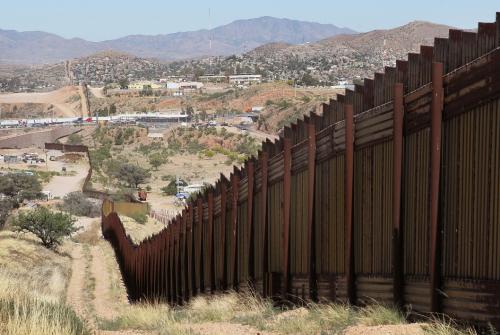Border Closure: Trump blackmailing Americans and Mexicans
Trump is threatening Mexico with closing the border, thus transferring responsibility for the growing flow of migrants to the US onto the shoulders of the government of López Obrador.
- Análisis

Mexico: President Donald Trump is again threatening Mexico with closing the border, thus transferring responsibility for the growing flow of migrants to the United States onto the shoulders of the government of Andrés Manuel López Obrador.
The blackmail expresses a mix of feelings of arrogance and egocentrism, inherent to his idiosyncrasy, with his vested interests in the reality of an electoral battle he has been fighting since he was elected president in 2016.
Trump seems bothered not only by López Obrador's position that the migratory exodus will only end if living conditions in the countries of origin improve and that this can be achieved through sustainable development programs, but also by the fact that Mexico has a government that is different from his interests.
While in South America they are making advances with the dismantling of a progressive structure that was gaining great strength, and have succeeded in imposing a neo-fascist government like that of Brazil and unjustly imprisoning Lula, a government has emerged in Mexico that they presume to be dissonant.
The environment that serves as a framework for Trump is perfect for his blackmail: a regressive South America that is returning to ideas such as the defunct Alliance for Progress, now called Prosur, to isolate an irreducible Venezuela against which all coup attempts have failed. Impressive economic and social progress in China and Russia – finally closer than when they disagreed in the past –, which constitutes an obstacle for the global geo-strategy of the United States because they are the alternative to a neoliberalism that is running out of steam and costs more work to export.
Finally, an electoral environment in the United States, for the first time permanent, that is being maintained from the very moment Trump won the presidency with the popular vote against him.
To a large extent, his international policy has a lot to do with the internal situation in the United States and his strategy to increase his chances of being re-elected. That perception is implicit in López Obrador's messages when he insists that he will not be dragged along by provocation and will not respond to his neighbor's diatribes.
The Mexican president considers that if the United States were to change its present electoral regime of four-year presidential terms and one re-election, for six years without the right to re-election, the projections of that country's foreign policy would probably also be different, and even internal ones. That's an opinion.
What is quite clear is the link between the threat of closing the border and domestic politics, as is the obsession with the construction of the wall. Both are part of the blackmail not only against Mexico, but against the U.S. opposition.
If he so wishes, tomorrow Trump can close the borders. It has already been done twice, once by Ronald Reagan in 1985 and once by George W. Bush, when the attacks occurred on the twin towers and the economic losses for U.S. businessmen were brutal.
No argument from Trump to now close the border crossings with Mexico is valid. Neither the fact that 76,000 undocumented people crossed the border in February, because it is a much lower figure than previously in this century, nor the fact that Mexico has done nothing to prevent it.
Mexico will neither change its position of not repressing and providing employment in the southeast to tens of thousands of Central Americans who so desire, nor will it abandon the economic and social development plans of southern Mexico, Honduras, Guatemala and El Salvador, for which, paradoxically, Trump has committed an initial funding of 10 billion dollars.
Aside from these arguments, closing borders has complications because it would have to be done without violating the constitutional rights of thousands of Americans and foreigners who will be affected, for example, on the border between El Paso and Ciudad Juárez, the busiest in the world.
In addition, it would paralyze the voluminous movement of trade between both sides, and daily sales in border cities, especially in the United States such as San Diego, California, which already suffered an economic emergency due to the absence of buyers during the closure of September 2001.
The economies of both countries are now much more closely linked than in the Bush era when daily trade was just over US $500 million a day and now exceeds $1.7 billion.
To paralyze it would be a tragedy of great magnitude. Evidently, that is one of the factors in Trump's blackmailing his own fellow citizens, and not just Mexico.
(Translation: ALAI)
Del mismo autor
- Juez opositor incendia sector eléctrico de México 22/03/2021
- Un año de pandemia de Covid-19 y de infodemia en México 02/03/2021
- Trump: empedrar el camino al diálogo Cuba-EEUU 13/01/2021
- Donald Trump, un presidente enloquecido pero no loco 08/01/2021
- El impacto de la Covid-19 en la economía 07/01/2021
- Dos años de un gobierno distinto en México 01/12/2020
- Donald Trump, el parto de los montes 30/11/2020
- Partido Morena, de México, en el filo de la navaja 01/11/2020
- Salvador Cienfuegos, 'El Padrino', y la soberanía mexicana 21/10/2020
- Mensajes del presidente López Obrador en su segundo informe a la nación 02/09/2020








